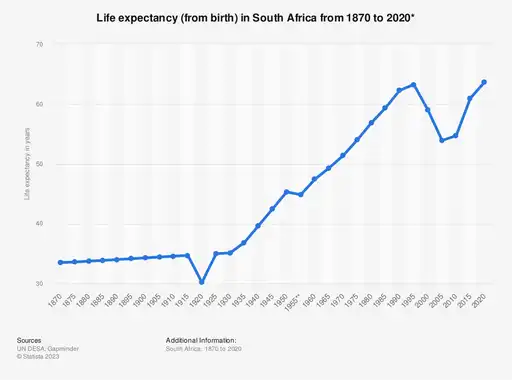Life Expectancy in South Africa

Life expectancy refers to the average number of years a person is expected to live, based on statistical data. In simple terms, it is an estimate of how long people, on average, are likely to live.
Life expectancy is influenced by various factors such as healthcare, lifestyle choices, genetics, and socio-economic conditions. Improvements in medical advancements, better access to healthcare, advancements in public health measures, and improved living standards have generally led to longer life expectancies over time.
Which race lives the longest in South Africa?
What is the current life expectancy in South Africa?
The current life expectancy in South Africa is approximately 63 years.
Has life expectancy in South Africa improved over time?
Yes, life expectancy in South Africa has improved over the years. It was around 54 years in 2000 and has increased since then.
What are the main factors affecting life expectancy in South Africa?
Main factors affecting life expectancy in South Africa include HIV/AIDS prevalence, high rates of violent crime, poverty, and limited access to quality healthcare.
How does HIV/AIDS impact life expectancy in South Africa?
HIV/AIDS has had a significant impact on life expectancy in South Africa. The high prevalence of the disease has contributed to lower life expectancies, particularly during the peak of the epidemic.
Are there gender differences in life expectancy in South Africa?
Yes, there are gender differences in life expectancy in South Africa. Women tend to have a higher life expectancy than men, with women averaging around 67 years and men around 59 years.
How does socio-economic inequality affect life expectancy in South Africa?
Socio-economic inequality plays a role in life expectancy in South Africa. Individuals from disadvantaged backgrounds often have limited access to healthcare, proper nutrition, and living conditions, which can impact their life expectancy.
What initiatives are being taken to improve life expectancy in South Africa?
The South African government has implemented various initiatives to improve life expectancy, including efforts to combat HIV/AIDS, improve healthcare infrastructure, and address socio-economic disparities.
Are there regional variations in life expectancy within South Africa?
Yes, there are regional variations in life expectancy within South Africa. Life expectancies can differ between urban and rural areas, with urban areas generally having higher life expectancies.
How do lifestyle choices contribute to life expectancy in South Africa?
Unhealthy lifestyle choices such as tobacco and alcohol use, poor diet, and lack of physical activity can contribute to lower life expectancies in South Africa.
Has life expectancy in South Africa been impacted by the COVID-19 pandemic?
Yes, the COVID-19 pandemic has had an impact on life expectancy in South Africa. The exact magnitude of the impact is still being assessed, but the pandemic has resulted in increased mortality rates and disruptions to healthcare services.
How does violence and crime affect life expectancy in South Africa?
High levels of violence and crime in South Africa contribute to lower life expectancies. Homicides and interpersonal violence are significant factors impacting mortality rates.
What is the impact of tuberculosis on life expectancy in South Africa?
Tuberculosis (TB) is a major public health concern in South Africa and has a significant impact on life expectancy. The high prevalence of TB contributes to reduced life expectancies, particularly in vulnerable populations.
Does access to clean water and sanitation affect life expectancy in South Africa?
Access to clean water and sanitation facilities plays a crucial role in life expectancy. Inadequate access to these basic necessities can lead to the spread of diseases and negatively impact overall health.
How does malnutrition influence life expectancy in South Africa?
Malnutrition, particularly among children, has a detrimental effect on life expectancy in South Africa. Insufficient access to proper nutrition can lead to stunted growth, weakened immune systems, and increased vulnerability to diseases.
Are there racial disparities in life expectancy in South Africa?
Racial disparities in life expectancy exist in South Africa. Historically, socioeconomic inequalities and healthcare disparities have disproportionately affected certain racial groups, impacting their life expectancies.
How does the burden of non-communicable diseases impact life expectancy in South Africa?
Non-communicable diseases such as cardiovascular diseases, diabetes, and cancer contribute to the burden of disease and impact life expectancy in South Africa. Lifestyle factors, including poor diet and physical inactivity, contribute to the prevalence of these diseases.
What role does the healthcare system play in life expectancy in South Africa?
The quality and accessibility of healthcare services are crucial for life expectancy. Adequate healthcare facilities, skilled healthcare professionals, and equitable access to healthcare play a vital role in improving life expectancy.
Does the HIV/AIDS epidemic continue to impact life expectancy in South Africa?
Although progress has been made in combating HIV/AIDS, it still has a significant impact on life expectancy in South Africa. Access to antiretroviral treatment and prevention efforts are crucial in addressing this epidemic.
Are there initiatives to address the factors impacting life expectancy in South Africa?
Yes, South Africa has implemented various initiatives to address the factors impacting life expectancy. These include HIV/AIDS prevention programs, increased healthcare funding, and efforts to reduce violence and crime rates.
What is the projected future trend for life expectancy in South Africa?
Future trends for life expectancy in South Africa are influenced by multiple factors. Continued efforts to address healthcare disparities, improve socio-economic conditions, and combat diseases are expected to contribute to gradual increases in life expectancy over time.




